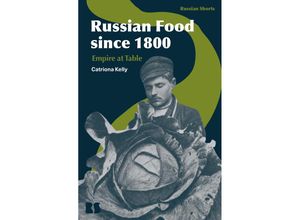In Russia food has a hugely important role in political symbolic and practical terms. In
this illuminating history of Russian food in the modern age Catriona Kelly - a leading
cultural historian and keen amateur cook - reflects on this and an environment where what you
eat (and drink) indicates how patriotic you are. Kelly argues that an expectation of 'feeding'
is embedded in attitudes to the state as provider and that rationing systems have
traditionally replicated and even enforced social hierarchies. The book looks at how Russian
food is intimately connected with family and friends and was an important source of delight
even in the Soviet period when official culinary provision and practices ostensibly sought to
promote nutrition above all and food was often short. Russian Food since 1800 traces these
complex and contradictory associations. It also examines various shifts in diet and cuisine
over the last three centuries including the ways in which old traditions such as pickling and
jam-making sit alongside wider world influences from the vast imperial hinterland in the Baltic
the Caucasus and Central Asia as well as Western Europe and America.



